Adopting new words like ‘deather‘ into the ridicule lexicon of bizarre right wing histrionics has been an effective defense against the recent onslaught of over-the-top demagoguery directed at President Obama and health care reform. While it’s only natural to mock the absurdity of calling end of life counseling ‘death panels,’ a closer look at the actual subject of the debate may not only expose the political theater but offer deeper insights into our collective psyche and the core of so much suffering, not only in this country, but around the world.
Allow me to lead off with the most natural and universal yet strangely forbidden and loaded statements anyone could make:
We’re all going to die, and it’s okay.
This is my father who passed away last year after we removed life support when there was no chance for recovery, the exact point he had specified in his living will. He went to a peaceful place not unlike what he was looking at here:
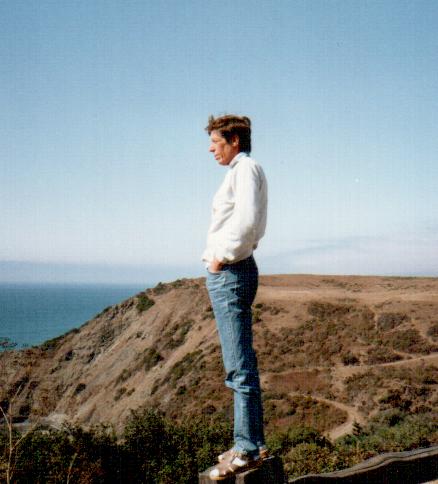
Let me preface what I’m about to say with the statement that on a pure political level it is absolutely mandatory to shove these outlandish fabrications about voluntary end of life counseling right back in the face of those who create them. If at a minimum this nonsense can be dispelled and the conventional wisdom diverted back into the only sane arena of “there are no death panels” with an added bonus assumption that a living will is a humane and responsible way to facilitate difficult end of life decisions, we’re par for the course.
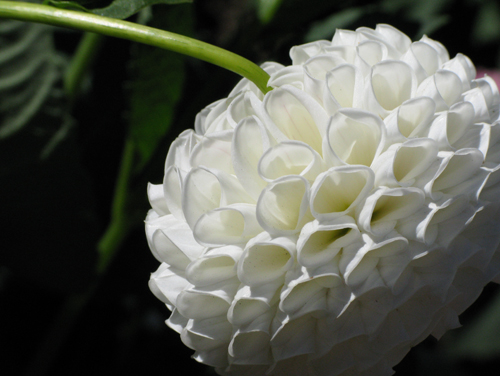
However, to stop there also means we are satisfied with playing on a small turf and on terms set by those who seek to gain political and financial advantage by spreading fear and appealing to people’s lowest instincts of self-interest. It means playing constant defense, for by the time we have defused the verbal death panel bombs so we can get to talking about actual health care, the next great assault on reason will already have been tossed our way. Socialism? Fascism? Racism? Birth Certificatism? Been there, done that. It’s a cat and mouse game, and it’s designed as such, but the ball we’re playing with is a poison pill.
The only way out of this vicious cycle is to elevate the conversation by confronting our own fear and looking the actual object of the controversy straight in the eye. So, taking a deep breath and centering ourselves in a place of deep reverence to all who’ve come before us and all who will follow, let’s talk about death, for there is nothing wrong with it.
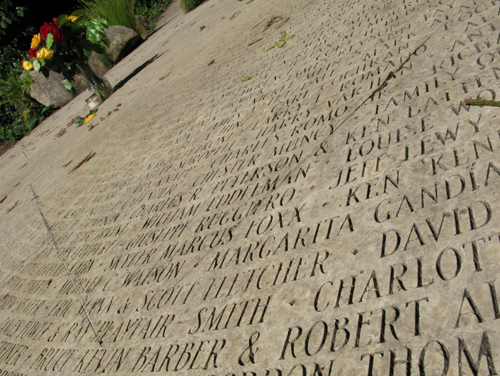
Life on earth is short. If you’ve ever stood on a granite bolder or hiked along a glacier you are reminded of just how tiny a speck our human lifelines are in the annals of planet Earth and the universe it inhabits. While some living things on Earth last longer than others, we ultimately must all go. The bees and birds. Trees and flowers. The fish in the sea. We humans. And yes, the glaciers and boulders, too, will eventually be washed down the river and into the sea.

Don’t stop there: even stars, planets and galaxies have expiration dates, in harmony with the great cosmic cycle of death and rebirth.
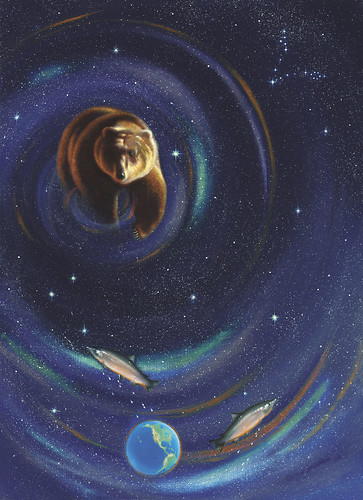
You see, it is what it is, and it all connects: day follows night follows day, high follows low follows high tide, breathing in follows breathing out follows breathing in, and the end follows a beginning follows an end. Like a gigantic pulse, we are moving to the steady beat of an infinite cosmic rhythm generated by our collective vibration. It is a divinely miraculous cycle that knows no borders or boundaries, with death and rebirth at the center of the rhythm. And yet, we celebrate birth while we fear death.
So why is it that something as natural and human as dying is met with such vehement fear and dread? Why is it that one of the greatest rites of passage that connects us all regardless of our status, color or disposition is as if it doesn’t exist? Why is our mortality a taboo of epic proportions, the mere mention of which evokes a whole range of defense mechanisms ranging from awkward denial to fiery anger? How did we get to a place where an open and honest look at our own mortality (a living will) could scare the living bejeezus out of us?
Time to take another breath…

In our western, material-oriented culture, we have surrendered matters of universal significance to our brains. While the heart can feel all there is without judging, the mind is a part of us that functions by putting a frame around everything. It likes to attach labels to things, diminish the world into tangible categories. The dualism of the mind can be quite useful in many day to day transactions that depend on technology and rational discourse. However, we have also allowed our minds to hijack the deeper mystery of our very existence, the essence of which can only be ‘seen’ through our third eye. We’ve divided something as infinitely beautiful and circular as our relationship to creation itself into black and white, good and evil, right and wrong.

Thus it has become possible to concoct or ‘believe’ God to be a vindictive entity, a furious force outside ourselves with the power to create dualistic chambers called heaven and hell. This is where fear originates, in the chambers of our own minds, the only place where such a thing as hell could even exist. It is thus no small wonder that when we have no control over the wild horses that are our thoughts we are ‘scared to death.’ For if we accept the premise that our existence teeters between right and wrong or good and bad, then there cannot be an escape from hell, which means according to our dualistic mind we are condemned to suffer for eternity. A lot of religions therefore are in the business of offering the carrot of heaven to us, but all it does is feed our fear of death, for to accept heaven as a mental concept automatically forces our dualistic minds to ‘believe’ in hell as a valid alternative.
So there. What a pickle we’ve put ourselves in! Can you feel the tragedy of that, deep down in your gut? Can you feel the suffering inherent in the thought that you will be judged even more harshly and fiercely after you’re dead — by an entity so big and wrathful beyond even your wildest imagination nonetheless? Can you feel the shame of being unable to live up to the superhuman expectation of never doing ‘bad’ lest you go to ‘hell?’ No wonder some people cling to the notion of ‘life’ with such desperate fervor that they will kill for it. No wonder we’re afraid to even think about death, much less talk about it openly.

The good news is that our fear of death is a learned behavior that we are capable of letting go off. This is not to confuse with our innate survival instinct, a more primal and healthy mechanism without which no life would exist at all. In fact, it is exactly our primal instinct that knows when our time has come. But if you look around the world, you will find many cultures who have a very open and accepting relationship to death. In India, death is viewed as a natural aspect of life, and there are numerous epic tales, sacred scriptures, and vedic guidance that describe the reason for death’s existence. The Tibetan and Egyptian Books of the Dead are open accounts of the experiences that the consciousness has after death, during the interval between death and the next rebirth. In Mexico, Dia de los Muertos, or Day of the Dead, is a national holiday celebrating and honoring those who have passed, often with music, dance and art.

Funeral procession are always in public…
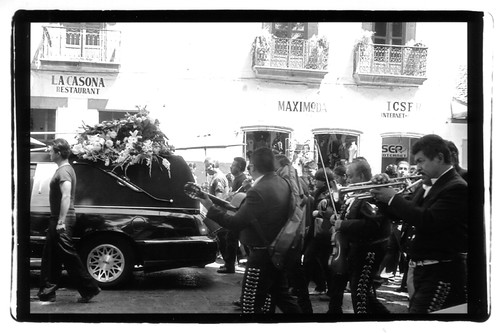
and coffin shops are often without storefront, right next to the grocery store…

It is, of course, difficult to unravel a long history of fear and shame surrounding death, but I think the current short window of attention paid to it is a good opportunity to actually look at the roots of some of the reactions surrounding this particular part of the proposed health care reform bill. From a purely political standpoint, I think it behooves us not to accept terms of discourse that are rooted in fear, so to say “you wanna talk about death? Ok, let’s talk…” is to come from a place of strength and confidence.
At the same time, having a genuine conversation about our mortality is an important aspect in aspiring toward the more conscious and compassionate society we desire, for to face our deepest fear is the first step in transcending it. Ultimately, we’re each on our own journey, but one thing is for sure — we are all going to leave our bodies eventually. This is what binds us all together, and it is the path we share. Or in the words of an Irish philosopher: “We are One, but we’re not the same.”
Blessed be on your journey!


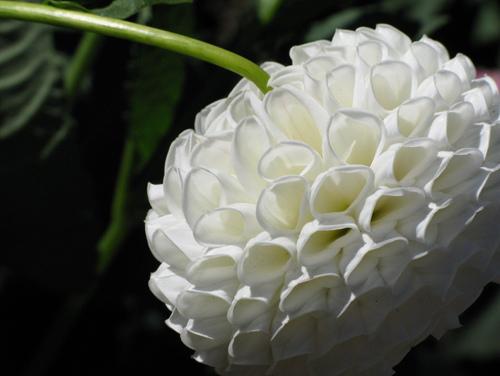






What a complex, thoughtful, and wise post. I love that you put so many pictures in, too. They add to the story you tell.
I haven’t read very many blog postings that touched me as much as yours. Thank you so much.
Pam B
Thank you kindly, Pam, and I am touched by your compliment!
Warmly,
Sven
Who ARE these “death panel” people? Nincompoops and lamebrains ??? Its obviously a scare tactic used by the republicans…insurance companies, hospitals and HMOs already use terms like “End of Life” to describe this consultation…Blue Cross, Humana, Catholic Healthcare West, Kaiser Permanente, they all use it!!! It’s as if these halfwit GOP sheep just started looking into healthcare for the first time in their lives….of course they could be just flamin’ hypocrites like Sarah Palin, who now hysterically cries out “death panels” despite the fact that she declared a “Healthcare Decisions Day” in Alaska just a little over a year ago.
“WHEREAS, Healthcare Decisions Day is designed to raise public awareness of the need to plan ahead for healthcare decisions, related to end of life care and medical decision-making whenever patients are unable to speak for themselves and to encourage the specific use of advance directives to communicate these important healthcare decisions. WHEREAS, in Alaska, Alaska Statute 13.52 provides the specifics of the advance directives law and offers a model form for patient use.
WHEREAS, it is estimated that only about 20 percent of people in Alaska have executed an advance directive. Moreover, it is estimated that less than 50 percent of severely or terminally ill patients have an advance directive.
WHEREAS, it is likely that a significant reason for these low percentages is that there is both a lack of knowledge and considerable confusion in the public about Advance Directives.
WHEREAS, one of the principal goals of Healthcare Decisions Day is to encourage hospitals, nursing homes, assisted living facilities, continuing care retirement communities, and hospices to participate in a statewide effort to provide clear and consistent information to the public about advance directives, as well as to encourage medical professionals and lawyers to volunteer their time and efforts to improve public knowledge and increase the number of Alaska’s citizens with advance directives.
WHEREAS, the Foundation for End of Life Care in Juneau, Alaska, and other organizations throughout the United States have endorsed this event and are committed to educating the public about the importance of discussing healthcare choices and executing advance directives.
WHEREAS, as a result of April 16, 2008, being recognized as Healthcare Decisions Day in Alaska, more citizens will have conversations about their healthcare decisions; more citizens will execute advance directives to make their wishes known; and fewer families and healthcare providers will have to struggle with making difficult healthcare decisions in the absence of guidance from the patient.
NOW, THEREFORE, I, Sarah Palin, Governor of the state of Alaska, do hereby proclaim April 16, 2008, as: Healthcare Decisions Day in Alaska, and I call this observance to the attention of all our citizens.”
Dated: April 16, 2008
To be able to take a national topic of debate and turn in into a deeply thoughtful blog….well, that’s just deep insight. Thanks so much for your writing.
Though I still have to come to grasp with “We are One, but we’re not the same.”
Mukesh
Thanks Mukesh, it is my hope that a lot of the topics that get brief but intense national coverage may be stepping stones for more meaningful discourse, and that was the intention of this piece. As far as “We are One, but we’re not the same,” the way I think of it is like a quilt. You know, it takes many different and unique pieces of fabric to make it, but the finished piece is one coherent piece that could not exist without its many parts.
[…] diatribes like Blaspheming at the Altar of Technology to “politual” jams like We’re All Deathers, from travel and farming stories like I shook the hand . . . and then it fed me to end-of-the-world […]